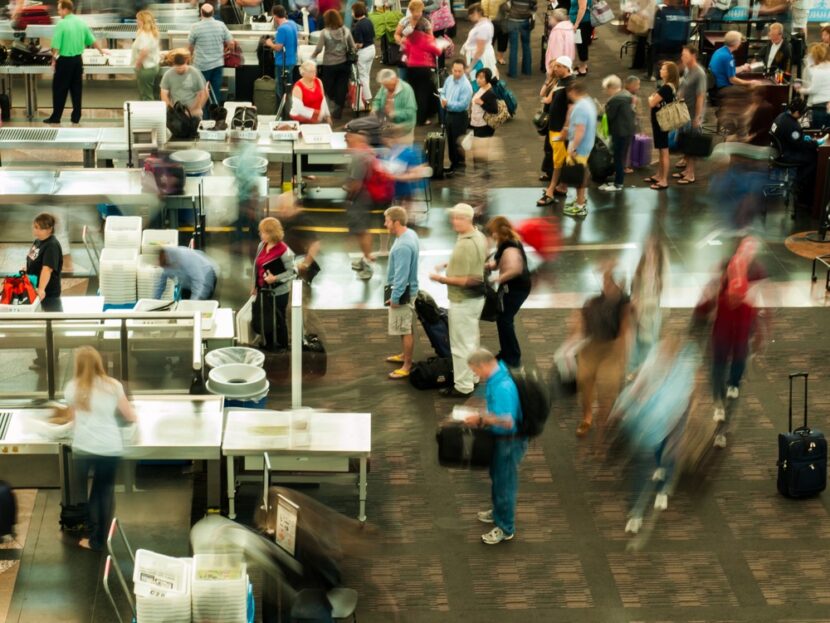WASHINGTON — Americans aren’t just grousing under their breath about long airport security lines—huge numbers are changing their travel behavior altogether, which is set to inflict billions in economic damage over the summer season, according to new research from the U.S. Travel Association.
A survey of 2,500 Americans found that of those planning plane trips between Memorial Day and Labor Day, 21.8 percent will either travel by other means or delay or cancel their trips because of saturation coverage of hours-long waits at airport security checkpoints.
60.3 percent of respondents said they would arrive at the airport earlier to cope with expected Transportation Security Administration (TSA) screening logjams. Only 17.9 percent said they will not change their travel behavior at all.
The data indicates that millions of Americans will either skip planned spending on travel or will spend less (replacing plane trips with road and rail means those travelers will not journey as far, U.S. Travel economists note). All told, the lost travel spending will total $4.3 billion for the three-month summer peak season—a figure that would have directly supported 37,500 additional domestic jobs.
“To put these figures in perspective, the problems at TSA security lines are costing our economy almost a billion and a half dollars in spending and more than 12,000 jobs every month,” said U.S. Travel Association President and CEO Roger Dow.
Dow noted that Airlines for America, the trade association representing most major U.S. airlines, has projected an average of 2.51 million daily plane trips during the upcoming summer months. It is unclear if that figure has already been influenced by the TSA effect or will be; but, Dow said: “We’re looking at convincing data that says hundreds of thousands of people are potentially reconsidering whether to get on an airplane every single day. Given the importance of travel to both our economy and our way of life, it is not an overstatement to call that a national crisis in need of a national solution.”
Dow did point to some encouraging signs of progress toward alleviating TSA’s woes. The Department of Homeland Security has announced a series of steps to better allocate staffing to address the wait time issue. Congressional panels have already passed measures to both steer existing budget resources toward TSA and to raise overall funding levels. Several other bills aimed at the problem are in the offing.
But, Dow said, there is little hope of help arriving in time for summer flyers.
“Unfortunately we’re well past the point when any single measure is going to provide enough relief to completely save the summer travel season,” Dow said. “The rosiest scenario we can hope for at this point is that policymakers sustain their level of attention on the TSA issue, and keep striving toward a wholesale policy shift that will set the system on the correct course over the long term. This economic research showing the dollars-and-jobs cost of TSA’s struggles will hopefully give federal officials the incentive they need to get there.”
Dow has previously stated that it is possible to streamline the screening process with zero compromise to the level of security. “It is axiomatic that security must always be the No. 1 consideration, because without it there would be no travel at all,” he said. “But we have seen more and more post-9/11 that security and convenience are not mutually exclusive—and, in fact, the best and most innovative policies can strengthen both simultaneously.”
Dow pointed specifically to TSA’s PreCheck trusted traveler program as a policy that benefits both security and convenience. Rigorously pre-screening travelers before they get to the airport eliminates them as threats—meaning precious resources can focus on unknowns, and those travelers can be moved more quickly through the system.
Dow again called for a “three-legged stool” effort to get more travelers into PreCheck, consisting of the government, the private sector and travelers themselves.
“We have to work on ‘three Ps’ when it comes to expanding PreCheck—price, process and promotion—and it’s not up to any one entity to get the job done,” Dow said. “It’s fair to ask what travelers themselves can and should be doing to help with the security line problem. We have already seen that travelers are self-correcting, because our survey shows that a big majority are showing up earlier and TSA just had a record week for PreCheck applications.”
U.S. Travel plans to release research examining how lowering the $85 cost to enroll in PreCheck or streamlining the application process can help the program’s numbers continue to grow.

